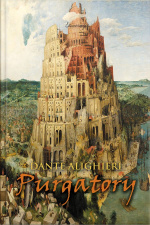La Vita nuova è la prima opera certa di Dante Alighieri, scritta probabilmente nel 1294, alterna bellissime liriche e capitoli in prosa a cui è affidato il doppio compito di...
Composto da Dante Alighieri tra il 1304 e il 1307, il Convivio è una trattazione colta ed erudita. Il termine «convivio» deriva dal latino...
La Comedìa, conosciuta soprattutto come Commedia o Divina Commedia è un poema di Dante Alighieri, scritto in terzine incatenate di versi endecasillabi, in lingua volgare...
"Die Commedia", in späterer Zeit auch Divina Commedia (Göttliche Komödie) genannt, ist das Hauptwerk des italienischen Dichters Dante Alighieri. Sie...
"Purgatorio" is the second part of Alighieri’s poem "The Divine Comedy". The story of Dante travelling through the nine circles of Hell in "Inferno" continues as he survives the...
La Divina Comedia es un poema alegórico donde el protagonista encuentra su propia identidad a través de un viaje desde el Infierno hasta el Cielo. La vida real y la sobrenatural...
The Divine Comedy describes Dante's descent into Hell with Virgil as a guide; his ascent of Mount Purgatory and encounter with his dead love, Beatrice; and finally, his arrival in...
Having survived the depths of Hell, Dante and Virgil continue their journey to the Mountain of Purgatory on the far side of the world. The mountain has seven terraces,...
The story of Dante's journey through the three realms of the dead, lasting from the night before Good Friday to the Wednesday after Easter in the spring of 1300. The Roman poet...
In the 14th century, after the Hell and Purgatory, Dante Alighieri writes "Paradise": this is the third and last part of the Divine Comedy. Is an allegory which tells of...












